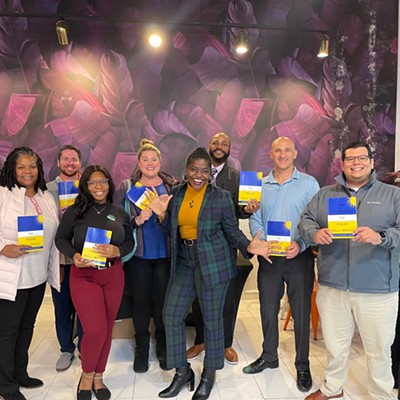The only thing most people might know about the Comanche Indian tribe is the climactic scene in the 1976 Clint Eastwood film The Outlaw Josey Wales.
You know: when Clint, I mean Josey, rides up to Chief Ten Bears and makes the famous “words of iron” speech, after which they slice their palms and shake hands in a blood oath of friendship?
Yup, those are the Comanches.
Turns out there’s a whole lot more to know, and that’s what hooked Texas Monthly editor and Boston native S.C. “Sam” Gwynne into the fascinating history of this tribe and their huge influence on the character of Texas and the American West.
He writes about it in his nonfiction bestseller Empire of the Summer Moon: Quanah Parker and the Rise and Fall of the Comanches, the Most Powerful Indian Tribe in American History, and he appears this Saturday at the Savannah Book Festival.
The Comanches, in fact, held dominion over a huge part of the continental U.S., called Comancheria by the Spanish and in turn the Mexican government — neither of which wanted any part of the fierce–fighting, hard–riding tribe.
The U.S. government also tended to let the warlike Comanches have their way with Texas settlers — prolonged torture, gang–rape, and mutilation of dead bodies were typical Comanche tactics — a dire situation which led to the establishment of the famous Texas Rangers and the founding of the independent Republic of Texas.
Empire of the Summer Moon has human stories, too, such as the tale of Cynthia Parker, a white settler kidnapped by Comanches and adopted into the tribe. She would go on to be the mother of the last free Comanche chief, Quanah Parker.
We spoke to Gwynne a few days ago.
How in the world did a Bostonian get so into the history of Texas and the old West?
S.C. Gwynne: I was initially in Austin as Time magazine bureau chief, covering George Bush and everything else that goes on here. And then I went to work for Texas Monthly. In those jobs I was always traveling around the state, and ended up falling in love with the western part of Texas. And as I did, I started hearing all these Comanche stories.
Where I grew up on the east coast, the last Indian was subdued 100 years before my forebears got off the boat in 1715 in Boston. This isn’t true in Texas. In Texas the memories of the frontier are immediate and right here, because it’s essentially only 100 years old. So I just started really getting into this stuff.
This will tell you how close the frontier is in Texas: A woman I worked with at Texas Monthly, both her great–grandparents were killed by Comanches.
People say all the time, especially in political arguments, “what’s the deal with Texas?” I show your book to them, and try to explain that by definition anyone who survived on the Texas frontier had to be extremely stubborn and have a mean streak.
S.C. Gwynne: I agree 110 percent. When I speak in public I say the very same thing.
A friend from New Jersey called me once and said “You’re crazy to live in Texas, they’re last in every social service category,” and all this stuff.
I said, look at the 40–year war against the Comanches, where there was no federal government, nobody to help them, they were completely on their own.
Gov. Rick Perry called me two months ago and we talked about this very subject. I said, Governor, when I’m on a speaking tour I always end up talking about you. I tell people, look at Rick Perry, that is the inheritor of this long bloody war. Not only with the Comanches, but the war for Texas independence.
That’s who it is, that’s who it looks like. If you think for a minute that Texas is going to be different, it just isn’t.
You center the book on Quanah Parker, the Comanche chief, but he is by no means the only important character. Tell us about that decision.
S.C. Gwynne: Yeah, Quanah pops in and out. That was the key decision. It’s the reason the book is a bestseller. If I did it like a James Michener book, starting at the beginning and moving forward in a linear way, it would never have worked.
I think one of the reasons this book is so popular with women in a way that many blood-and-guts Westerns are not, is because it’s essentially the story of a woman and her family. Alternating chapters, I was able to give readers both things: A small, intimate narrative of the Parker family, and the larger big picture about guns and horses and Texas Rangers and the Spanish.
It’s an amazing story all around. I can’t believe it’s not better known.
S.C. Gwynne: That’s the thing: You didn’t know anything about this stuff, I didn’t know anything about this stuff. We’re smart guys, we read a lot, and we didn’t know anything about this. I said to myself, look, if I don’t, and people like you don’t, then editors in New York sure as hell don’t!
And it became a strength. The greatest compliment I’ve ever gotten was from a woman at a signing. She said, “You know what you wrote here? You wrote a Hey Honey Book!”
I said, what’s that? She said, “I’m sitting in the living room and I read something really good or funny, and I’ll go, ‘Hey, honey, did you know that...’”
So the fact that nobody knows this stuff becomes a selling point. Editors read it and go, “Oh, I didn’t know that.” If you ask me, Jack Hayes, who founded the Texas Rangers, should be a household word like Davy Crockett. I have no idea why he isn’t, but he should be.
He was an amazing man. And what he did in Texas was just the beginning of his career. He was a hero in the Mexican War, he blazed the first trail to El Paso, he was the sheriff in San Francisco during the Gold Rush, he founded Oakland, California.
But your next book isn’t about Hayes, it’s about Stonewall Jackson, another fascinating Southern figure.
S.C. Gwynne: Exactly. In fact my biggest decision on my next book was whether to do Hayes. I’m a Yankee by background, and growing up we didn’t care all that much about the Civil War. One of my journeys in this book is getting into the Confederate point of view.
My wife is from the southern part of West Virginia, and she sees the world through Confederate eyes. I’m coming to sympathize with the South. I’m a traitor to my class, I guess (laughs).
S.C. Gwynne @ Savannah Book Festival
When & Where: 5:15 p.m. Sat. Feb. 18, Telfair Academy rotunda
Cost: Free and open to the public
Info: savannahbookfestival.org
































